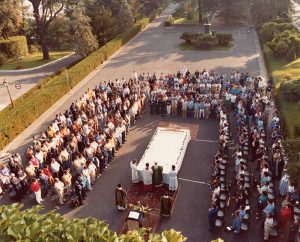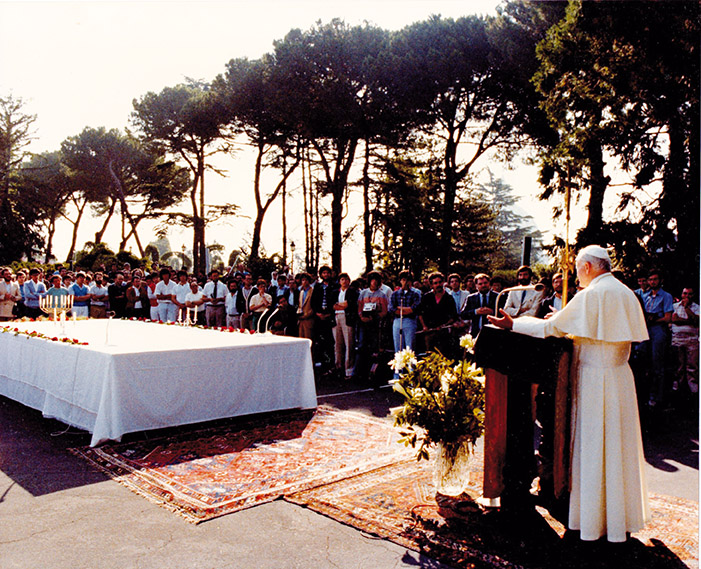Eucharist in the Vatican Gardens July 3, 1983
St. John Paul II
Vatican Gardens, July 3, 1983
“The harvest is great but the laborers are few. Pray therefore the Lord of the harvest to send out laborers into his harvest.” This famous passage of the Gospel of Luke given by the liturgy of the day, has been the center of contemplation and prayer carried out yesterday, Sunday, July 3, by the Holy Father along with around four hundred young people who, the previous week, lived a three-day spiritual retreat on the theme of the vocation in Porto San Giorgio. The Eucharistic celebration, with which the Pope wanted to demonstrate to the young people engaged in a serious and responsible vocational journey his paternal sympathy and support, took place early in the morning in front of the altar in the grotto of Our Lady of Lourdes in the Vatican Gardens. Among the young people – all of them guided into vocational reflection by the Neocatechumenal Way – there were some fifty seminarians out of the one hundred and fifty that the Neocatechumenal Communities have offered so far to the Church in Italy. But among these young people who yesterday prayed with the Pope, many others, more than sixty, are prepared to answer the call that the spiritual retreat, just finished, has decisively clarified for them. Around the large table prepared in the center of the assembly, thirty priests have celebrated with the Pope. Kiko Argüello – who with Carmen Hernández, who was also present, is the founder and animator of the Neocatechumenal Way – has led the songs of the assembly.

In the homily, the Holy Father has addressed the assembly with the following words:
“1. ‘The harvest is abundant and the workers few; therefore ask the owner of the harvest to send laborers into his harvest’ (Lk. 10,2). This affirmation, steeped in longing and open to hope, dear seminarians and dear young people, resonates today for you gathered here, in this grotto in Lourdes, at the beginning of a Eucharistic celebration that takes place in such a suggestive setting. The workers are few: this problem was presented to Jesus, when entrusting to his disciples the mission of preaching the Gospel to the people, and the same problem also arises in our days, currently and always urgent. Countless people, scattered throughout the world, await the word of salvation. A problem, then, of yesterday, today, forever. The peoples of the earth continuously grow in number and yearn, more or less consciously, to discover the fundamental values that give meaning to human life. Furthermore, all those who have already accepted the Gospel run the risk of forgetting it, besieged, as they are, everywhere, by attractive but fundamentally fallacious perspectives. Therefore, they need someone who helps them relive the word of Jesus. And then the truth to be communicated is so rich and broad that it needs a continual deepening to unravel all its value and savor all its sweetness. These brief allusions, inspired by today’s Gospel, are enough to make us glimpse how necessary it is to ask incessantly “to the owner of the harvest to send workers to his harvest” (ib).
2. The message to be announced is above all a message of salvation for man: ‘Tell them: the kingdom of God is near you’ (Lk. 10,9). The kingdom of God, which is the victory of His love over all sin and human misery, is already in your midst. Furthermore, it is a message of hope, of consolation, as the prophet Isaiah announced: “Celebrate Jerusalem, rejoice with her … like a child who is comforted by his mother, so I will comfort you … when you see him, your heart will rejoice” (Is 66, 13-14). Indeed, man is destined to realize in Christ the Redeemer the fullness of the divine vocation. It is also a message of peace and charity: ‘Say first: peace to this house … heal the sick that are in it’ (Lk. 10,5-9). The kingdom of God is being built in history, offering already on this earth its fruits of conversion, of unification, of love among men.

3. What should the apostle be like, with what spirit will he carry out his mission? First of all, he must be aware of the difficult and sometimes hostile reality which awaits him: ‘I send you like lambs in the midst of wolves’ (Lk. 10,3); the work of the evil one makes this reality adverse. Therefore, the apostle will strive to be free of human conditioning of all kinds: ‘Do not carry a bag or a saddlebag or sandals’ (Lk. 10.4), to rely only on the Cross of Christ from which our redemption comes, as St. Paul says in the second reading. To glory in the cross means abandoning all motives of personal pride, in order to live only on faith and thanksgiving for the salvation accomplished through the sacrifice of Jesus. What remains crucified is the world of personal selfishness, self-sufficiency, security in one’s own merits.
Dear seminarians and dear youth: The mission of the apostle is a sublime, exciting mission that is directed to the good of the whole world; it requires such great generosity that it far exceeds man’s capacity. For this reason, it is necessary to elevate our spirit to the highest, invoking divine help, which you can ask for with confidence through the intercession of the Mother of Jesus and our Mother. I want you to be joyful apostles in the exercise of your own mission, so that you are conscious, trusting, spiritually free. The disciples sent by Jesus ‘returned full of joy’ (Lk. 10, 17). You too, during these years of preparation for the priesthood, learn the art of being joyful, not for human reasons, but based on the certainty that ‘your names are written in heaven’ (Lk 10,20), that is, that you are predestined by the love of Christ Jesus. He has called you from your families, from the bosom of your ecclesial communities to become his co-laborers, his priests, dispensers of his divine mysteries.
Joy is the work of the Holy Spirit in us (cf. Gal. 5.22). Trust his inner guidance, his powerful and unfailing support to your vocation, so that it may mature ‘in pace et gaudio’ and thus bear abundant fruits of eternal life.”